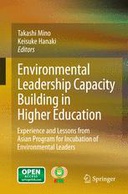Explore

Environmental Leadership Capacity Building in Higher Education: Experience and Lessons from Asian Program for Incubation of Environmental Leaders
The Graduate Program in Sustainability Science under the Department of Urban Engineering of The University of Tokyo has been running an environmental leadership education program at the graduate student level since 2007 called the Asian Program for Incubation of Environmental Leaders (APIEL). This book describes the University’s experiences in establishing and organizing that program and provides some lessons learned for those who are considering starting environmental leadership education programs. APIEL’s curriculum includes the classroom topic “Environmental Challenges and Leadership in Asia.” As well, the APIEL program has field units to provide experience in problem solving, decision making, and participation, taking into consideration ecological, political, economic, social, aesthetic, and ethical aspects. Another characteristic feature of the program is that it promotes changes in attitudes and behavior that will help to solve existing environmental problems and to avoid a generation of new ones. Over the four years of study, efforts have been made to bond leadership with field-oriented exercises such as: 1) The Intensive Program on Sustainability; 2) an integral approach focused on sustainable integrated watershed management of arid regions; 3) sustainable development of programs in Cambodia, Vietnam, and Thailand for qualifying students with problem-solving processes to combat issues such as flooding, lack of proper urban environmental infrastructure, and health risks; and 4) the Greater Pearl River Delta program with multicultural diversity to bring about sustainable urban development for a green city. All of those are described in the book. Last but not least, APIEL’s resonance throughout international networks and alumni are introduced.
This book is included in DOAB.
Why read this book? Have your say.
You must be logged in to comment.

